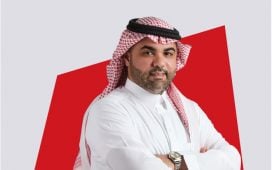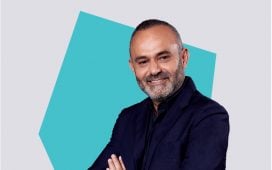Christian Turner, group director of naming across EMEA for Siegel+Gale, tells Eleanor Dickinson why brands should ditch the ‘monolithic’ names of old and tell a new story

“In a name change, people talk a lot about what they are losing and there’s less talk about what you gain,” says Christian Turner, the recently-appointed group director of naming across EMEA for Siegel+Gale. “I think incrementally when you change your name, the first thing people ask is ‘Why are you doing this?’, so it’s a wonderful opportunity to tell an updated story – if indeed there is a positive and compelling updated story to tell.”
In a country changing as quickly as the United Arab Emirates, Turner is unlikely to be short of a new story or two to tell. The wordsmith, who can boast of naming The BlackBerry Playbook, was appointed to his new position in July after seven years creating names for some of the world’s biggest brands including American Express, HP and The New York Times. He was behind a group tasked with the major project of naming the 9/11 Memorial, a project that saw the entire brand team win an award at Cannes in 2010.
Having now made the move from New York to work between London and Dubai, Turner has already worked on rebranding the Dubai Inn as the Rove Hotels for Emaar. For a recent appearance in Dubai as part of Siegel+Gale’s Simplicity Talks series, he composed the essay The Next Authenticity, in which he argued that names should look to express a “simple truth” in a “compelling and even surprising” way rather than relying on consumers’ loyalty to locally-honed brands in an increasingly competitive landscape.
And never has the drive to be seen as ‘cool’ among the MENA region’s young and tech-savvy generation hit such a critical point. Look at the Middle East’s telecom firms, for example, following their European counterparts and ditching their ‘provenance-and-industry’ monikers in favour of shorter, snappier and ultimately more human names. Just as Spain’s Telefónica relaunched itself as the glamorous-sounding Movistar in 2010, many MENA telecom operators have radically transformed their names, including Qatar’s Qtel, which gave itself the tongue-rolling title of Ooredoo – ‘I want’ in Arabic.
In his essay, Turner described these former names as “outmoded, inefficient, oversized” and perhaps most pointedly, “inhuman”. For him, dropping them has become more than just a trend within the region but a need, which allows the telecoms industry to shrug off their stuffy, government connotations and position themselves as competitors on the free market.
“Telecom networks were set up by governments, not as competitive enterprises but generally as state-owned monopolies where services were provided,” he says. “Qtel is the provenance, the place where the telecom came from plus the category. Well those things sound monolithic. They are not particularly appealing, they are not particularly cool and they are tied to the place where they’re from so the minute you introduce competition into telecoms or if one wants to jump market and do something new, those names work less well and they are inefficient. They only tell you where the company started, what they used to do and their category. So I think Ooredoo, but also Zain here, have the same relationship to their previous versions that Fusion Movistar has for Telefónica… in trying to appeal to people and be part of their lives rather than a manifestation of their government.”
Nevertheless changing a brand is a drastic measure, he says, especially in terms of both the physical costs (re-packaging, new signage etc) and the brand’s equity. However, that does not mean firms should ignore the opportunities that can arise from such a measure.
“If you’re in more places, doing more things and doing those things better than you’ve ever done them before, it can be a wonderful way to signal that and a wonderful way to engage people, assuming you get the right name and you do something that people find compelling. It’s almost always done with a new visual identity and a new brand experience that can motivate and please as much as engage new customers,” he says.
“One of the challenges – or certainly what our clients regard as a challenge – is being able to speak to the [Middle East’s] wide-ranging audience, especially when you think of the number of different variations of Arabic, the number of different cultures and places where people come from. But I think you can flip that challenge on its head and view it as an opportunity. If you’re not able to speak 100 per cent effectively to these individual audiences, rather than focussing on modulating an approach for each, it does give you the opportunity to generate a name that you think tells a simple idea in a really compelling way and can begin a conversation with all of these audiences. So the name is not going to do it all – there are a lot of things that you’re going to be able to add to that. But you can use the name to be distinctly yourself, be genuine and that’s compelling with most people.”









